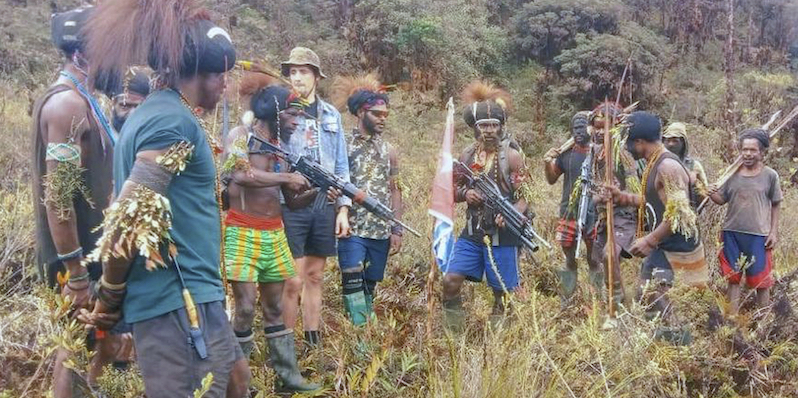Loading player
The separatist group of the Indonesian province of Papua has released photos and videos showing Phillip Mark Mehrtens, the New Zealand pilot taken hostage on Wednesday 8 February. Mehrtens appears in good condition but surrounded by armed fighters from the West Papua Liberation Army, a group that seeks recognition of West Papua’s independence from Indonesia. The group did not ask for a ransom but justified the kidnapping as a “tool of struggle” for independence.
The Indonesian province of Papua, which occupies the western half of the island of New Guinea, should not be confused with Papua New Guinea, an independent state which occupies the other half of the island. The independence movement has been active for decades, but the clash with the Indonesian authorities seems to have intensified since 2018, when more than twenty workers working on the construction of a road in Nduga province were taken hostage by the rebels: nineteen of them and an Indonesian soldier were later killed.
The kidnapping of the New Zealand pilot, which took place a week ago, has brought international attention back to the issue of the Indonesian province.
Mehrtens was driving a small Susi Air aircraft which was to evacuate fifteen workers of an Indonesian construction company. In the mountainous areas of the province of Papua, transfers by air are the only ones possible, due to the absence of roads and connections. According to local authorities, the fifteen workers had been subjected to threats by the separatist group. As soon as Mehrtens’ plane, carrying five other passengers, had landed on the small runway of Paro, in the province of Nduga, it had been attacked by separatists, the armed wing of the Free Papua movement: the five passengers had been freed as indigenous Papua, the pilot had been taken hostage.
The videos sent to the agency Associated Press show the rebel leader, Egianus Kogoya, together with Mehrtens.
In the videos, Kogoya assures that Mehrtens will not be in danger if the Indonesian army does not try forceful actions, but does not indicate conditions for his release: “I took him hostage for independence, not to have food or drink”. In another video men armed with rifles, machine guns, but also bows and arrows invite Mehrtens to say: “Indonesia must recognize Papua’s independence”, while in a third the guerrillas set the plane on fire.
Indonesian government officials have assured that diplomatic channels are being pursued to obtain the hostage’s release, but have not ruled out other solutions and have reiterated that the province will remain a part of Indonesia “forever”.
The region was part of the Dutch colonies in the area and is culturally and ethnically distinct from the rest of Indonesia. When the Netherlands granted independence to Indonesia in 1949, it retained sovereignty over the western provinces of New Guinea, with plans to transition to another independent state. Indonesia immediately claimed the provinces and the dispute was handled by the United Nations between 1961 and 1963: the provinces declared independence, then Indonesia took control by force. In 1969 a referendum was organized by the UN: it won the accession to the Indonesian state, in a consultation, however, considered by many observers to be tainted by fraud.
Since then the independence movements have started a low-intensity war: the provinces are rich in mineral resources (especially gold, nickel and oil) also exploited by foreign companies, but the population lives in extreme poverty and in the total absence of infrastructure, except to the coastal cities, where mostly immigrants from other Indonesian islands live.
The indigenous inhabitants, mainly Christians (Indonesia is instead predominantly Muslim) and ethnic melanesiana (closer to the populations of New Guinea and the Fiji Islands) reside in the provinces of the interior. Most Papuans living in rural areas have one of the highest poverty rates in Indonesia and are not literate. The policies of the central state have always been highly contested: since the 1970s the Indonesian government has been involved in creating infrastructures for the exploitation of resources, but not for improving the living conditions of the population.
New Zealander Phillip Mark Mehrtens was taken hostage a week ago (TPNPB via AP)
This also made the workers engaged in road construction a target of the rebels while under attack of the West Papua Liberation Army, violent repression often followed with systems much criticized by human rights organizations: arbitrary arrests, extrajudicial killings, corruption of public officials, electoral fraud and abuse of power by policemen and soldiers.
The killing of the group of workers in 2018 led to a strong reaction, which in 2019 was denounced by popular protests, accusing the central government of racism towards indigenous peoples.

One of the protests by indigenous activists in December 2022 (AP Photo/Tatan Syuflana)
Over the years, the provinces of Papua and West Papua have gained greater autonomy from the Indonesian central government, but have also been arbitrarily divided into sub-provinces. The intention seems to be to divide the independence front and to create “safe” areas for large mines and for immigration from other parts of the country. The area is difficult to reach by international and independent media, and entry is subject to the granting of a visa by the Indonesian government, which is difficult to obtain.
